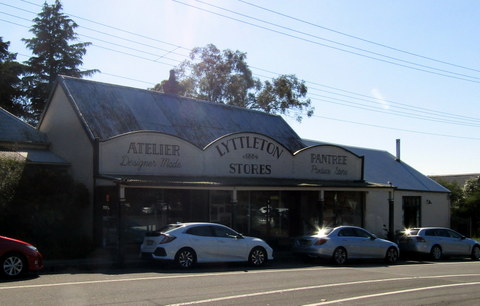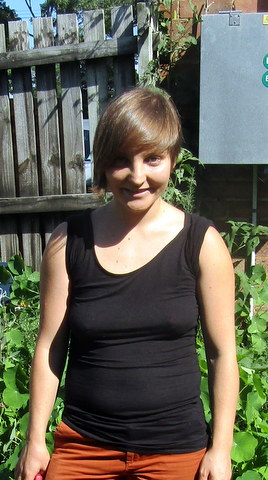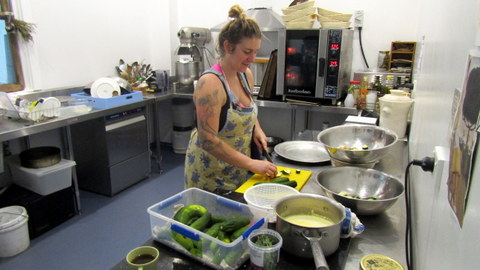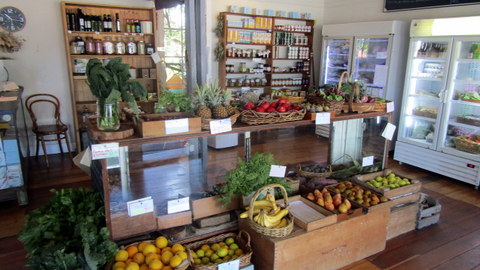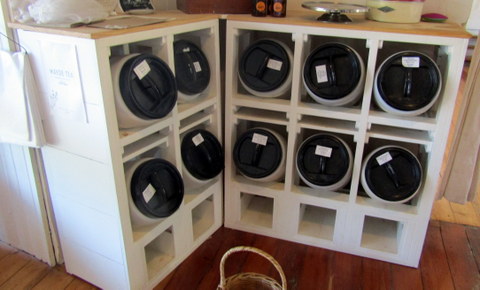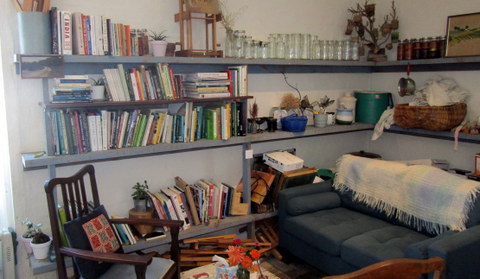Just recently I was privileged to get a glimpse into a new way to cooperatively produce and exchange food locally. Six local women have gotten together to run an enterprise which sells fresh and preserved food which has been locally produced, bulk foods and arts and craft items, in a refurbished old shop. They have also set up a ‘community hub’ where people can sit down, read from the reference library of sustainability books, and eat food cooked onsite with local produce as well as some vegetables and herbs grown in a small garden beside the shop, and you don’t get much more local than that!
The Ladies Involved
Manu in the Garden
Manu, a small scale food grower with a background in permaculture and regenerative agriculture, manages the vegetable garden, teaches and coordinates vegetable gardening and permaculture workshops and events, and runs the ‘backyard grower’ system in the shop. She also records all that goes on in the Lyttleton garden blog.
Allegra is responsible for bookkeeping, accounts, payroll, human relations, and coordinates all the other art, craft, cooking and homesteading workshops.
Eloise has a background in media arts and museology. She coordinates Atelier, curating the space as well as building connections with local makers of hand-crafted home wares, jewellery and other objects.
Charlotte is the Pantree organic produce shop coordinator. She manages orders, suppliers and everything to do with selling organic produce.
Kim is the kitchen coordinator. She bakes artisan sourdough bread, crafts daily dishes, ferments, dries and preserves all excess produce from the shop.
Jacinta supports coordinators, develops new projects, chairs meetings, and researches funding and grant opportunities.
Kim in the Kitchen
Their original concept was that the cooperative would take produce from local small farmers (2acre to 20 acre farms) who were farming at least organically, but preferably regeneratively. Initially this was only 3 to 4 local farms. The fruit and vegetable obtained from them was retailed through the shop (Littleton Stores) which is located in Badgery Crescent, Lawson, in the lovely Blue Mountains west of Sydney.
The fruit and vegetables proved popular to the extent that they would regularly run out of produce, which would require them to restock from the organic markets in Sydney. This was not an ideal situation and so they came up with an idea to increase their supply of local organic produce by approaching local backyard growers.
The Blue Mountains has quite a lot of older homes, and a lot of those homes have fruit trees in their back yard…..mature fruit trees! So while all of us new sub-dividees (including St Clair) have to wait for years for their fruit trees to get big enough to provide a really decent harvest, there in the Blue Mountains you can move into a place where the trees are already providing bountifully. However, there are also a lot of people who have been there for a long time and are becoming somewhat……mature themselves. They may no longer have the physical capability to allow the processing large amounts of fruit, so what do they do?
They become a registered backyard organic grower of Lyttleton Stores!
So to increase the availability for sale of local organic produce, they contacted friends and family in the area to let them know if they had any produce gluts they could bring them to the shop and they would be give store credit for the cost price of the produce.
These older producers in the area are also generally on a pension, which does not pay for much, so it was a win-win situation: the shop got produce to sell and the locals were able to provide themselves with a variety of fresh or preserved organic food with no money changing hands! Winner! This word of mouth campaign resulted in their first 10 to 15 backyard growers.
However, even with the produce coming in (initially mainly fruit) there was still a need for more local organic producers, so they did a callout for more backyard growers through their Facebook and Instagram pages. This was met with great interested a quite a number of people we keen to become Lyttleton backyard growers.
As with any new idea, some fine-tuning needed to be made to ensure growing practices used by growers were in line with what Lyttleton stands for: organically grown, no chemicals and preferable with care for soils. When it was restricted to friends and family (including extended family) they knew the produce was grown organically (at least) and regeneratively at best, but as soon as other producers are thrown into the mix, they devised a protocol for inspecting and approving growers so they could become registered backyard growers of Lyttleton Stores.
Assessing Growing Practices for Registration
To get around this the Lyttleton Stores collective developed the ‘Lyttleton Organic Backyard
Standard’. This is a document which sets out a series standards which people wishing to register can be assessed against. The standard elements include:
• Fertilisers and soil health.
• Pest and disease control.
• Wildlife.
• Weed control.
• Seed raising.
The standards provide some background information around the requirements for each element and then sets forth three standards –
Best Practice – what your backyard production would look like if you were doing it regeneratively,
Allowed practice – while not being best practice, these methods can be used and registration will still be achievable, and
Prohibited Practice – such as using synthetic pesticides and fertilisers which means the backyard grower will not be able to be registered at the moment.
In all cases the grower can alter their practices to achieve the next rung up the ladder and if they move from prohibited practice to allowed practice they may become eligible for registration at a later time.
The Lyttleton Organic Backyard Standard may be downloaded in its entirety here.
The standard is used by a member of the cooperative who is experienced in assessing growing practices to review each and every new applicant for registration.
Planning Supply
With the large number of producers coming on line (50+ as of April 2018) and with the production of fruit Vs vegetables approaching the 50:50 mark, some method of planning was required to smooth out variations in supply. This has been twofold, with the first innovation being to make a note on the registration form of what produce the new grower can provide at what time of year. This is all entered in a spreadsheet, which will be used to monitor backyard grower produce and harvest year after year.
Also, where it was originally set up so that growers could drop off produce at any given time and then make purchases with their store credits, this became difficult where many growers had gluts of the same type of produce. A policy was put in place so that growers must phone the shop before harvesting to ensure the produce is required at that time. For example if someone wanted to harvest their large supply of kale, but the shop already has sufficient for their needs, the grower could be instructed to put off their harvest for a week (or whatever) to spread out the supply. This can reduce problems with uneven supply of produce and the resultant waste.
Keeping up with the Joneses’
Organic and regenerative farming is a small sector in Australia at the moment, but it is growing and farmers (including the Lyttleton Stores ladies) attend a yearly conference called “Deep Winter”. It is held in winter each year (who knew?) and according to the website (link here) “is a loose affiliation of Australian farming friends (both old and new) who gather together in the deep of winter to share stories, solidarity, seeds and cider.”
This is a great initiative, which I highly recommend you visit if you are in the area, they are just off the main road through the Blue Mountains and easy to find. They are open from 9:00am - 6:30pm Monday through Saturday and 10:00am - 5:30pm Sunday.
The community hub is open when the shop in open during the week and becomes the workshop space on the weekend.


